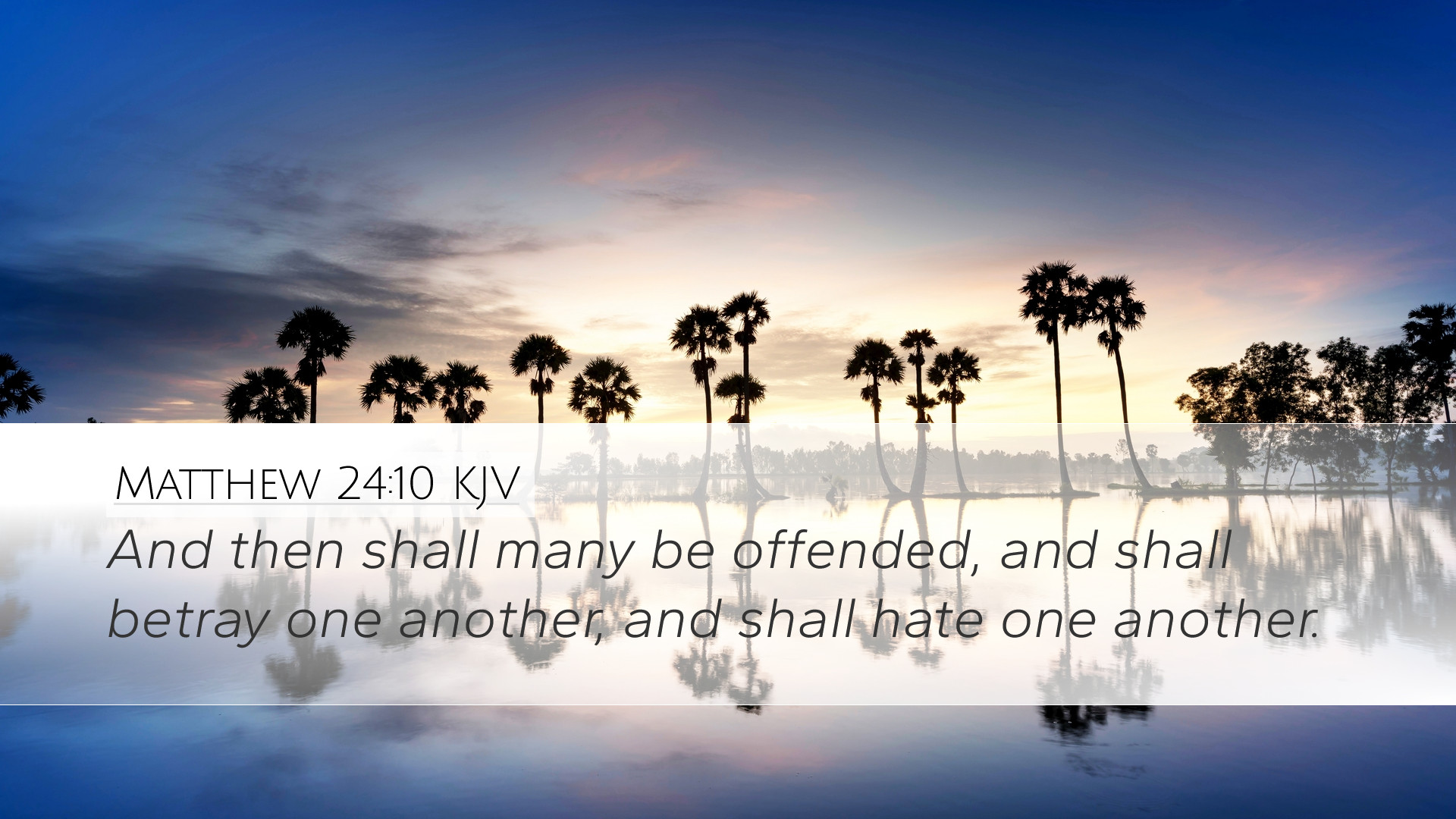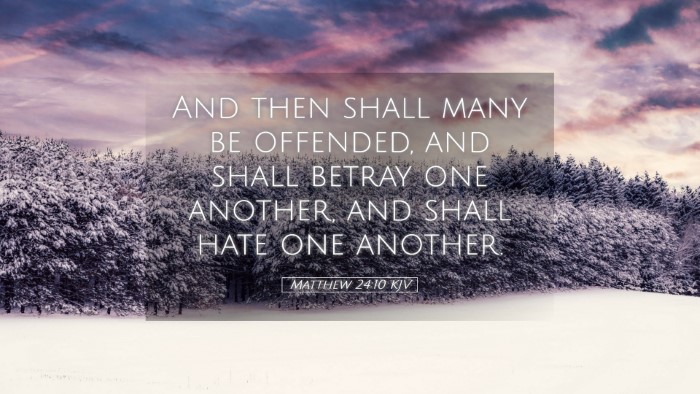Matthew 24:10 Commentary
Text: "And then shall many be offended, and shall betray one another, and shall hate one another." (Matthew 24:10, KJV)
Introduction
Matthew 24:10 is an integral part of Jesus' teachings about the signs of the end times, presenting a profoundly sobering outlook on the state of humanity as the culmination of history approaches. This commentary synthesizes insights from renowned public domain commentators, including Matthew Henry, Albert Barnes, and Adam Clarke, to glean deeper meanings from this pivotal verse.
Exegesis of Matthew 24:10
In this verse, the term "offended" captures a sense of betrayal stemming from the faith and moral failures that ensue in a time of great tribulation. This verse demonstrates a culmination of social and spiritual upheaval, indicating a deterioration of relationships, trust, and community.
Matthew Henry's Commentary
Matthew Henry emphasizes the prophetic aspect of this verse, suggesting that "many will be offended" signifies a broader spiritual defection. He notes that as persecution rises, individuals may find themselves disenchanted with faith, leading to a cascade of betrayal among acquaintances.
“The love of many shall wax cold,” he continues, illustrating the chilling effect of tribulation on interpersonal relationships. This serves as a warning to believers about the fragility of human connections and the ease with which love can diminish under pressure.
Albert Barnes' Insights
Albert Barnes highlights the sociopolitical implications of this betrayal. He explains that as false teachings proliferate alongside persecution, many may defect from authentic belief systems and establish factions. "Betrayal" is not only of personal nature but can also extend to public disassociation from the faith community.
He states, "The verse predicts a time when individuals will become so disillusioned that they will not only turn against their neighbors but will also act against their own professed beliefs." This anticipation of familial and community discord underscores the grave implications of spiritual decline.
Adam Clarke's Perspectives
Adam Clarke focuses on the emotional and psychological dimensions of being "offended." He argues that the term reflects a deep sense of disenchantment and frustration with the prevailing conditions. "Hate" becomes a natural culmination of betrayal, where mistrust blossoms into animosity.
Clarke notes that the societal fabric is frayed, leading to distrust among individuals that creates a fertile ground for hatred to take root. He reinforces the need for vigilance among believers, who may also unknowingly succumb to such emotional turmoil.
Theological Implications
Matthew 24:10 serves as a reminder of the potential for spiritual decay during turbulent times. The commentary from Henry, Barnes, and Clarke collectively underscores several theological implications:
- Human Nature and Sin: The propensity for betrayal and hatred reflects humanity's fallen nature and the ease with which sin can infect communities, even among believers.
- Perseverance in Faith: The passage urges the Church to stand firm in faith, even as conditions worsen. Believers must support one another in the face of challenges.
- Warnings Against Complacency: It serves as a wake-up call to pastors and theologians to address the issues of disillusionment and moral failure within their congregations.
Practical Applications
As this verse resonates with the current socio-spiritual climate, its applications for today’s church and Christian living are significant:
- Encouragement for Fellowship: Create communities where believers can support and strengthen each other, countering the trends of betrayal and resentment.
- Emphasis on Discipleship: Reinforce strong theological education to prepare believers for challenges that may provoke offense.
- Promoting Love and Forgiveness: Actively teach about the countercultural values of love and forgiveness to combat hatred.
Conclusion
Matthew 24:10 presents a stark prophetic warning about the dangers of offense, betrayal, and hatred as signs of the times. By synthesizing insights from Matthew Henry, Albert Barnes, and Adam Clarke, we recognize the vital need for the Church to remain steadfast, united, and grounded in love—not just for one another but for the world around us.


